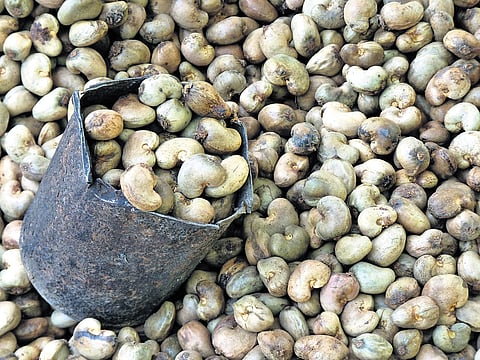

KOCHI: Indians are munching on cashew nuts like never before. Now, India accounts for more than 30% of the world’s processed nuts or kernel consumption. And the demand for nuts, whole or broken, is surging at a phenomenal pace, driven largely by the bakery and snacking industry.
According to the International Nut and Dried Fruit Council (INC), the country’s insatiable appetite for cashews touched 3.76 lakh tonnes in 2024, and shows no signs of slowing down. For good measure, the projected annual growth in demand stands at 8%.
“The world now looks to India for growth in the nuts and dry fruits market,” INC director Pratap Nair told TNIE.
He says the Indian middle class has developed a taste for cashew nuts, not just as a snack but also as an ingredient in baked goods and other food items.
“Take Kaju Kathli, for instance: it has become one of the most popular sweets in the country, both as a gift and for personal consumption, and the demand for roasted cashews to make it is skyrocketing,” said Pratap, who is also a representative of Vijayalaxmi Cashew Company (VLC), one of India’s oldest and largest cashew exporters.
He noted that post-pandemic, Indians have developed a voracious appetite for snacking on cashews despite their premium price tag of around Rs 1,200 to Rs 1,500 per kilogram for whole nuts. According to INC data, India accounted for 13.5% of global raw cashew production, 36.5% of global processing share, and a staggering 30.5% of total global cashew consumption in 2024.
“The domestic demand for cashews has exploded with the growth of the bakery and snacking industries,” said Hari Nair, of Western India Cashew Company.
“Cashews are an integral part of namkeens (savouries), sweets, and even temple offerings. In fact, the Tirupati temple alone is one of the largest consumers of cashews, using them to make laddoos that are in huge demand among devotees.”
Burgeoning domestic consumption has also led to a change in the dynamics of the industry, which was once clustered around Kollam, known as the cashew capital of the world. Swaminathan, a native of Tamil Nadu, established the first cashew processing unit in 1925.
The same year marked another milestone with industrialist Joseph Periera setting up the first modern cashew factory in Kollam, introducing advanced roasting methods that would shape the industry’s future. For decades India, and particularly Kollam, was pivotal in the global cashew trade until the emergence of Vietnam in the ‘90s. A study by the Madras Institute for Development Studies reports that, in 1961, India had 96% of the global cashew kernel exports market.
In 2024, the country’s cashew kernel exports have plunged to 8% of the global trade, and in terms of volume, the export of cashew kernels declined from 1,26,667 tonnes in 2004-05 to 59,581 tonnes in 2022-23, J Rajmohan Pillai, Beta Group chairman and owner of the Nut King brand, said.
“While it’s challenging to provide a precise, real-time figure for cashew imports versus consumption in India, the data clearly indicates that imports of raw cashew nuts are the primary source of raw material for India’s cashew processing industry, which caters largely to the growing local demand,” he said.
Rajmohan further explained that without these imports, India wouldn’t be able to meet its substantial domestic demand for cashews. In fact, over 60% of the raw material processed by India’s cashew industry comes from imports. Given India’s status as the largest consumer of cashew kernels globally, with a significant portion of processed kernels consumed locally, it is clear that a substantial portion of the country’s cashew consumption relies on imported raw cashew nuts, he added.